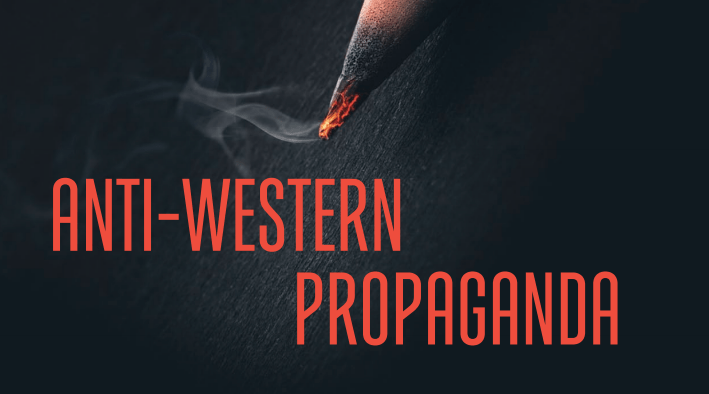
MDF Releases Report on Anti-western Propaganda in Georgia
A new study, presented by Media Development Foundation (MDF), a local media watchdog, says in 2019 the Kremlin propaganda campaigns in Georgia maintained strong anti-U.S. and anti-NATO messages, while statements supporting Russia increased.
The watchdog argued, that the anti-western propaganda also channeled identity politics, speculating that Western values are incompatible with Orthodox Christianity and that the West causes moral degradation of Georgia.
MDF’s study was supported by USAID-funded “Promoting Integration, Tolerance, and Awareness (PITA)” program, administered by the UN Association of Georgia.
Media Development Foundation monitors anti-Western propaganda since 2014. Their fifth annual report analyzed 15 outlets, including TV, print, and online media. A total of 2,769 anti-Western comments was revealed, up by 15.7% compared to the previous year.
Anti-western Message Box
The report revealed that two new messages were prevalent concerning the U.S., with the first involving that the Anaklia deep seaport project is not an economic project, but has a defense-military purpose for the U.S.; and second, statements on the unsuitability of deploying a U.S. military base in Georgia.
The latter “followed a comment of the President of Georgia [Salome Zurabishvili] who equated such a possibility to provoking Russia, therewith providing a fertile ground for a statement of pro-Russian actors,” the watchdog added.
Speaking of the increase in anti-NATO messages, MDF said it can be “attributed to an aggressive campaign on Georgia’s neutrality, conducted by a pro-Russian political party, Alliance of Patriots.”
MDF noted that anti-EU messages remained almost the same as in previous years, showing a decrease since 2017 when Georgia secured visa-free travel with the Schengen area.
As for increased statements in support of Russia, the watchdog said they accentuated the need to settle conflicts through revising Georgia’s foreign policy course and dealing one-on-one with the Kremlin.
Regarding the incompatibility of values and loss of identity, a leading theme was a threat about homosexuality and perversion been forced on Georgians; this was followed by messages about the fight carried out against Orthodox Christianity, and Church, and unacceptable values imposed from the West. Yet another message was that the West fights against the traditional family, and the national identity of Georgians.
Conduits of Disinformation: Media, Parties, and Organizations
The main source of anti-Western messages was media, followed by political parties and politicians, noted the CSO.
MDF identified five media outlets — Georgia & World, and Sakinformi, “both with close links to the Kremlin,” TV Obieqtivi “affiliated with a pro-Russian political party, the Alliance of Patriots;” and “ethno-nationalist” Asaval-Dasavali and Alia outlets, “often repeating the narrative of pro-Kremlin media” — as main sources of anti-Western messages.
Among the political parties, in 2019, Alliance of Patriots led the list, ex-speaker Nino Burjanadze’s United Democratic Movement, the Neutral Socialist Georgia, and the Georgian Idea.
MDF also noted that “a number of statements of the ruling party Georgian Dream are not included in the quantitative data of anti-Western messages because of their indirect nature.”
The watchdog added that it identified 23 civil organizations spreading anti-western messages in 2019, including a new organization “Development Laboratory of Georgia” (led by former MP Irakli Gogava which often appears on TV Obieqtivi), Primakov Georgian-Russian Civil Center and Eurasian Institute.
The CSO also named the representatives of society, including retired general Guram Nikolaishvili, self-styled knight, businessman Levan Vasadze, analyst Tamar Kiknadze, and expert Mamuka Areshidze, among the most active in terms of spreading anti-western narratives.
Also read:
- Alliance of Patriots Rallies, Wants NDI, IRI Banned in Georgia
- Slamming NDI, IRI, Ivanishvili Says ‘U.S.-founded Institutions Devalued’ in Georgia
- “Georgia’s Minorities Have Diverging Views on EU, NATO” – Interview with Laura Thornton
This post is also available in: ქართული Русский